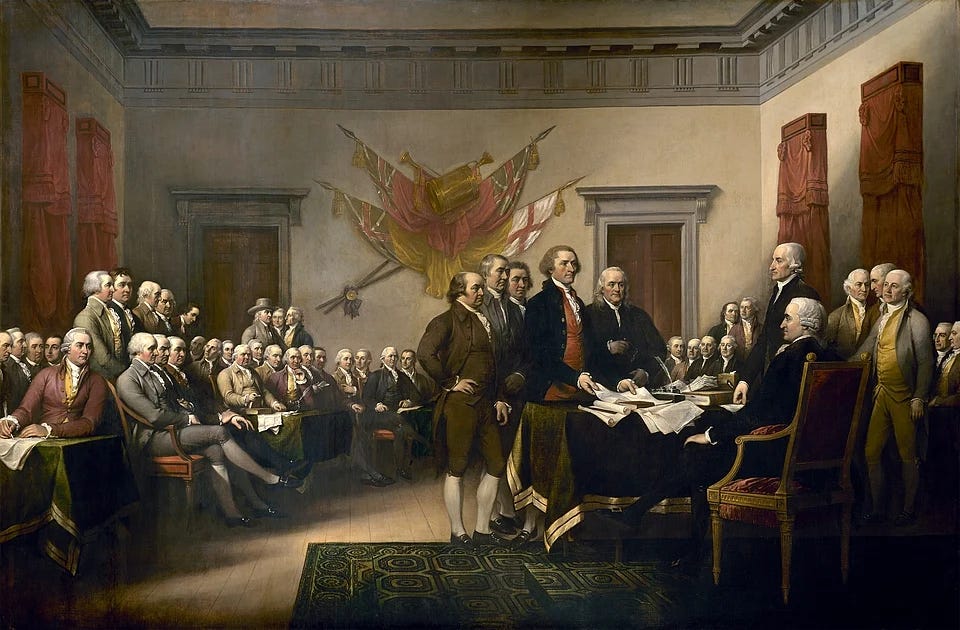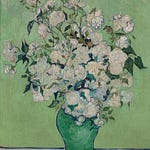What does it mean to be born in certain land and not another? Read on!
In celebration of the three-year anniversary of Word & Song on the Fourth of July, we are offering a special on new paid, gift, and upgraded subscriptions.
THS WEEK ONLY
One day back in 1985, as I was traveling alone through Italy, I was walking up one of the steep streets of Assisi, when a car pulled up alongside me, and the driver called out in English, “Hello, son — can you tell me where the cathedral is?” “Sure,” I said, “it’s right up this hill — keep going straight and you won’t miss it.” But something puzzled me. I was dark and skinny, with wavy black hair, just as anybody whose ancestors were all Italian might be. “How could you tell I was American, when I speak Italian, and my grandparents are all Italian?” He laughed. “You walk like an American,” he said. “You walk like you’re determined to get somewhere, fast. Italians don’t walk like that.” I was taken aback. Of course he was right. For better and for worse, it was exactly so: I walked with a will. That meant I was likelier to get somewhere I’d decided upon. It also meant that I was less likely to enjoy or even to notice anything along the way. My nation — our Word of the Week, was the United States, not Italy. What I knew about soccer could fit on an index card. I played baseball — as did Joe DiMaggio and Ron Santo and Tony Lazzeri and Phil Rizzuto and Yogi Berra and his boyhood pal in their Italian neighborhood in Saint Louis, the sportscaster and raconteur Joe Garagiola. They were all born Americans, and so was I.
We’re going all in for celebration and patriotism this week at Word and Song, and why not? This week in the United States we will be celebrating our Independence Day, July 4, which Americans consider the birthdate of our nation. That is when, in 1776, the founders signed the Declaration of Independence from our mother country, Great Britain.
Our friends in Canada will also be celebrating, as July 1 is their Canada Day, what used to be called Dominion Day, to commemorate the establishment of Canada as a self-governing Dominion of the British Empire, on July 1, 1867. That’s when the British North America Act united “Canada,” which meant Ontario and Quebec, with New Brunswick and Nova Scotia into the new Dominion of Canada. I’d always thought that Canadians looked more fondly upon merry old England and treasured that literary and cultural heritage more dearly than Americans did, which was saying something, because in the old days you couldn’t get through an American school without learning about Chaucer and Shakespeare, Milton and Pope, Wordsworth and Tennyson, and that doesn’t even touch the immensely popular Charles Dickens. When Dickens came to visit the United States in 1867, as a one-man stage show for performing various characters from his novels, the line in Manhattan to get opening night tickets stretched for five miles.
I don’t know if Old Man River or the mighty Saint Lawrence mean as much to Englishmen as the Thames means to us who love English literature. I hope so, but I’d understand if it isn’t, and in any case, just as I’m not an Italian, so too I’m not an Englishman — but there’s a warm region of my heart where an Englishman and an American can sit outside a cafe in Florence and, if they can’t talk together about baseball and cricket, they can talk about Dante and Shakespeare, or gelato.
I guess that to be born in a certain land is to be born into a vast history, a world of meaning. I’m not speaking of anything peculiarly political or legal. To me, the best of the United States is Tennessee Ernie Ford singing that great coal miner’s song, or the chipper twang of an Iowa farmer. It’s what I introduced to an Italian student from Yale when he came to visit me in Providence: we went in the middle of the afternoon to have breakfast at an American diner, where he had, for the first time in his life, pancakes with maple syrup. “It comes from the sap of a tree?” he asked, looking a bit askance and not sure that he wanted to order it. “Trust me!” I laughed. He did, and he enjoyed it!
What binds a people in one are not mainly laws, but folkways, songs, mountains, plains, long highways, memories, gratitude. It’s not what you produce but what you receive as a gift. And it should be so. For the word nation, as you probably wouldn’t guess, is cousin to the English words kin and kind. “How can that be?” you ask. Well, there’s a consonant missing. The archaic Latin verb was gna-scere, to be born, with the past participle gna-tus. The g before n, when not preceded by a vowel, turned silent and eventually was omitted in writing. A natio, nation, is literally a people born together, united by blood and customs and place and memory. The Indo-European root was the ancestor of other words that have to do with birth, such as Latin gen-us, kind (consider our Germanic word mankind), or Greek gign-omai, to be born. But since Indo-European g became Germanic k, we have kin, kind; even the word kindly once meant natural (oh, and by the way, Latin natura and its descendants in English nature and natural are also among the cousins). In some mysterious way, though my blood is Italian, my birth and my nature, my nation, is American.
Listen to this episode with a 7-day free trial
Subscribe to Word & Song by Anthony Esolen to listen to this post and get 7 days of free access to the full post archives.












